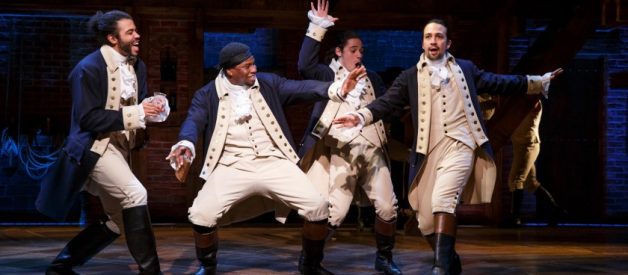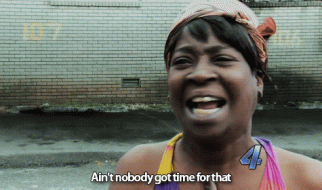Shakespearean allusions in Lin-Manuel Miranda?s 2015 smash hit musical Hamilton, the story America?s founding father, Alexander Hamilton, aren?t hard to find. There are direct quotes ? Angelica advises Hamilton to, ?screw [?his] courage to the sticking place? (?Take a Break?/Macbeth, 1.7.61). There are also nods to typographical anomalies in Shakespeare?s early printed works that saw stage directions find their way into speech:
Hamilton: Enter me
Lafayette, Mulligan, Laurens: (He says in parentheses)
The opening song ? acting as a prologue worthy of a Shakespearean history play ? introduces our protagonist, Alexander Hamilton, and the key characters in his short life. In a piece of perfect doubling and foreshadowing, Miranda allows Mulligan and Lafayette to acknowledge that, ?We fought with him?, a reference both to their Act 1 roles as Hamilton?s friends and battle mates and to their Act 2 roles as Maddison and Jefferson where they fight with him as enemies. Similarly, Laurens claims, ?Me? I died for him?, a fact equally true to his Act 2 doubled role as Philip Hamilton, who is killed in a duel defending his father?s honour. Parallels to Shakespeare?s implied doubling ? Titania/Hippolyta, Oberon/Theseus, Cordelia/The Fool ? cannot be ignored. This article, the first of a two-part series, considers Miranda?s use of linguistic codes to isolate Aaron Burr, the musical?s primary antagonist, and place him in the Hamlet-like role of a character ultimately destroyed by his own inaction.
Oskar Eustis, the artistic director of The Public Theatre in New York, Hamilton?s first home, claimed of Lin-Manuel Miranda that: ?Lin does exactly what Shakespeare does, he takes the language of the people and heightens it by making it verse. It both ennobles the language and the people saying the language?. Like his earlier hip-hop musical In the Heights, Miranda fuses a variety of musical styles with nods to Latin American beats, Broadway ballads and island rhythms. But at Hamilton?s heart is hip-hop. The musical started life as a hip-hop album, which Miranda famously described to President Obama as: ?a concept album about the life of someone who I think embodies hip-hop ? Treasury Secretary Alexander Hamilton?. When performed at the White House in May 2009 near the start of the Obama Administration, Miranda?s account of the ?bastard, orphan, son of whore and a Scotsman, dropped in the middle of a forgotten, spot in the Caribbean? (?Alexander Hamilton?) ? the immigrant who rose to the top ? spoke to Obama?s America. An America that was 13% foreign born that had just elected the son of a Kenyan man and Kansas woman as president. Not only that, Miranda addressed this America in hip-hop, a musical genre and culture with its roots in inner-city African and Latin American heritage.
Where does that leave Aaron Burr? Within an ostensibly hip-hop musical, Burr doesn?t have that much interest in hip-hop: his signature beat is closer to dancehall rhythms. Miranda did much of his exploration into Hamilton?s life in Nevis, writing Burr?s songs around his research ? as he puts it, ?my pulse was already on island rhythm time?.? In ?Aaron Burr, Sir?, a scene that Miranda notes is an homage to J. K. Rowling?s Harry Potter meeting Draco Malfoy ahead of his true friends, we meet Hamilton?s crew as they introduce themselves in a ?love letter to old school hip-hop?? ? evidenced through recognisably retro rap phrases such as ?I?m John Laurens in the place to be?.
 Daveed Diggs (Lafayette), Okieriete Onaodowan (Hercules Mulligan), Anthony Ramos (John Laurens) and Lin-Manuel Miranda (Alexander Hamilton): Production Image ? Joan Marcus
Daveed Diggs (Lafayette), Okieriete Onaodowan (Hercules Mulligan), Anthony Ramos (John Laurens) and Lin-Manuel Miranda (Alexander Hamilton): Production Image ? Joan Marcus
Burr is taunted as ?the prodigy of Princeton College?, mocking his perceived elitist status, and encouraged to ?Give us a verse, drop some knowledge?. Burr is equally dismissive in reply, placing himself in the role of outsider in this first meeting:
Good luck with that: You?re taking a standYou spit. I?m ?a sit. We?ll see where we land.
Hamilton?s wedding celebration further emphasises Burr?s otherness. In a mirror of the earlier ?Aaron Burr, Sir?, Burr walks in on Mulligan, Laurens, Lafayette and Hamilton mid-drinking song (?The Story of Tonight (Reprise)?), the quick exchanges between the friends solidifying their common tongue. Burr and Hamilton?s rhythmic yet essentially spoken exchange is at odds with both the familiar drinking song he interrupts and Angelica?s frenzied refrain in the preceding ?Satisfied?. Burr?s otherness is noted ? challenged by Mulligan to ?spit a verse?, he declines, belittling the relationship between the friends (?I see the whole gang?s here?), and his refusal to participate sees him dismissed as ?the worst?. There is an irony therefore that Miranda is obsessed with rhyming lyrics with Burr. In a dedication to rhyme that Shakespeare would?ve admired, Miranda remarks ?I know every word that rhymes with Burr. It?s a long list. I tried to use them all?.?
Burr alone seems to be the only character not obsessed with spitting verses. This is essentially a Shakespearean device. There is extensive scholarship on Shakespeare?s use of prose (generally for the low-born or comedy) and verse (generally the preserve of nobility and lovers). Miranda borrows this idea of linguistic codes and uses it to isolate Burr. His reluctance to ?spit verse?, to speak in the common tongue, marks him as different. If hip-hop is the heartbeat of Hamilton, Burr?s island beats are arrhythmic.
Hip-hop is set up not only as the common language, but as the language of revolution. In contrast, Burr, whose modus operandi is set up at the outset as ?Talk less [?] Smile more [?] Don?t let them know what you?re against or what you?re for?, adopts a less overt approach to change. Hamilton says of himself, ?They think me Macbeth, ambition is my folly?, in ?Take a Break?. If Hamilton is seen as Macbeth ? ?young, hungry and scrappy? ? whose ambition is his ultimate tragic flaw, then Burr is more closely aligned to Hamlet, whose inaction ultimately leads to his downfall.
 Lin-Manuel Miranda (Alexander Hamilton) and Leslie Odom Jr (Aaron Burr): Production Image Joan Marcus
Lin-Manuel Miranda (Alexander Hamilton) and Leslie Odom Jr (Aaron Burr): Production Image Joan Marcus
?My Shot? is arguably Hamilton?s signature song, setting up his life?s purpose ? he?s ?not throwing away [?his] shot?. It sets him up as a man of action: a catalyst for social change. While his new friends join in with his refrain, Burr remains unaffected, interrupting the fluid verse-swapping narrative with a characteristic warning to be cautious: ?Geniuses, lower your voices. You keep out of trouble and you double your choices?. If Hamilton is all about taking his shot, Burr is clearly not. Parallels to a certain Danish Prince, who likewise misses his opportunity to take his shot, cannot be ignored. In failing to kill Claudius when he has the chance in Act 3 Scene 3, Hamlet?s inaction sets in motion a series of events that will ultimately lead to his death. Similarly, Burr ultimately takes his shot at completely the wrong time ? Hamlet mistakenly kills Polonius whereas Burr (somewhat needlessly) chooses to shoot Hamilton in the final duel.
Where Burr?s inaction is most noticeable is in his reluctance to state his position. Opting to ?keep all [?]his plans close to his chest? and ?see which way the wind will blow? (?Non-Stop?), it?s never clear what Burr wants ? the closest we get to an answer is ?to be in the room where it happens? ? but if Burr wants power, in this musical led by action, inaction will never be the means to gain it. Followed immediately by Burr?s apparent political flip to Democratic-Republican (?Schuyler Defeated?), Burr?s motives seem as muddled and erratic as Hamlet?s. Forced to back either Jefferson or Burr, Hamilton ultimately backs Jefferson ? a man he has ?never agreed with once? over Burr as ?when all is said and done / Jefferson has beliefs. Burr has none? (?The Election of 1800?) ? an endorsement that hands Jefferson a landslide victory. Ultimately, Burr?s inaction is his downfall. His failure to act, to be clear what he stands for, keeps him away from the position of power he seeks. As foreshadowed in the outset when Hamilton asks him, ?If you stand for nothing, Burr, what?ll you fall for?? (?Aaron Burr, Sir?), Burr falls by standing for nothing.
In the second part of this two-part series, I will consider the impact of Miranda?s explicit references to Macbeth.
[1] McCarter, Jeremy, and Lin-Manuel Miranda. Hamilton, The Revolution. Little, Brown, 2016, p. 103
[2] https://www.youtube.com/watch?v=WNFf7nMIGnE
[3] Carter, Jeremy, and Lin-Manuel Miranda. Hamilton, The Revolution. Little, Brown, 2016, p. 15
[4] McCarter, Jeremy, and Lin-Manuel Miranda. Hamilton, The Revolution. Little, Brown, 2016, p. 137
[5] McCarter, Jeremy, and Lin-Manuel Miranda. Hamilton, The Revolution. Little, Brown, 2016, p. 25
[6] McCarter, Jeremy, and Lin-Manuel Miranda. Hamilton, The Revolution. Little, Brown, 2016, p. 23


